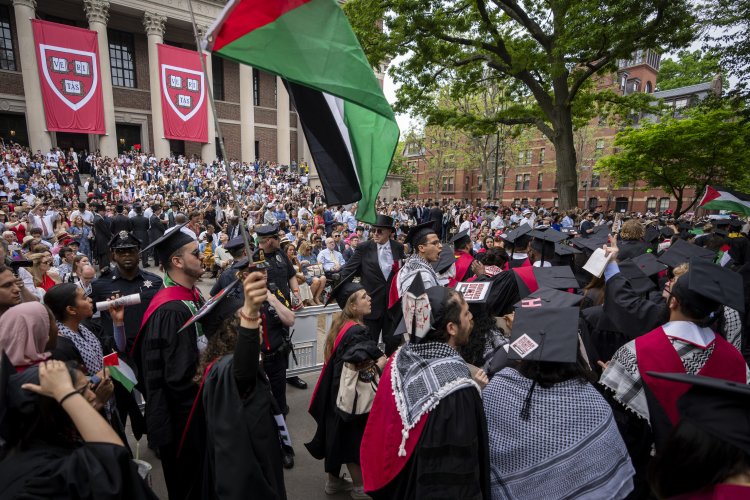Why Harvard Maintains Its Stance Against Trump
A concerted effort by the White House to target the nation’s leading universities is spearheaded by influential figures in the West Wing, such as Stephen Miller, who is Trump’s primary policy adviser.

This week, Harvard announced its intention to challenge a series of demands from the Trump administration, positioning itself against the White House and potentially leading to a significant legal confrontation.
Tensions are escalating quickly. Federal authorities have frozen over $2 billion in grants to the university after it declined to adhere to several requested policy changes from the Trump administration, which include addressing student protests, modifying admissions and hiring practices, and submitting to government audits. Trump suggested on social media that Harvard might lose its tax-exempt status and could “be Taxed as a Political Entity.”
With an endowment exceeding $53 billion and a robust alumni network, Harvard is now distinctly situated to stand out as the most significant U.S. institution actively opposing Trump’s attempts to influence American civil society.
“Harvard — by virtue of its resources, its history and its commitment to free speech — is in a position to defend itself,” noted Steven Hyman, a former provost at Harvard.
Although tensions have been rising for months as the Trump administration has targeted other elite institutions, this week marks a pivotal moment in Trump’s campaign against organizations he perceives as adversarial — a significant chapter in the 388-year history of the nation’s wealthiest university.
“Politicians have traditionally, bottom line, been proud of the fact that American higher education was the envy of the world,” remarked Thomas Parker, a Harvard alum and senior associate at the Institute for Higher Education Policy in Washington. “It is unprecedented for the view to be the opposite.”
The campaign against the country’s leading universities is spearheaded by influential figures in the West Wing, including Stephen Miller, Trump’s chief policy advisor; Vince Haley, director of the Domestic Policy Council; and May Mailman, a senior policy strategist and Harvard Law School graduate.
Harvard faces a critical decision: whether to engage in negotiations with the Trump administration or to resist legally. The university is being represented by two attorneys well-regarded on the right: William A. Burck, who has defended many of Trump’s allies in legal matters, and Robert Hur, a Harvard alumnus who produced a report on former President Joe Biden’s handling of classified documents, frequently referenced by conservatives during the 2024 campaign.
This confrontation is also highlighting the university’s president, Alan Garber, who assumed his role last year following the resignation of his predecessor, Claudine Gay, amid a plagiarism scandal and criticism regarding her management of campus antisemitism.
At 69 years old, Garber, whose background includes degrees in economics and medicine and a reserved demeanor, might not seem like a natural choice for a resistance leader. However, his response to Trump this week has been embraced by Democrats and many within Harvard as a model for opposing the president’s actions.
In a statement released Monday, Garber asserted that the Trump administration's demands infringe upon “Harvard’s First Amendment rights and [exceed] the statutory limits of the government’s authority.”
“No government — regardless of which party is in power — should dictate what private universities can teach, whom they can admit and hire, and which areas of study and inquiry they can pursue,” he expressed.
White House press secretary Karoline Leavitt countered on Tuesday, saying that Harvard “has not taken the administration’s demand seriously.”
“All the president is asking is, don’t break federal law, and then you can have your federal funding,” she added, noting that Trump “wants to see Harvard apologize” for “the egregious antisemitism that took place on their college campus against Jewish American students.”
Many on the left are hopeful that Harvard’s stand will inspire a broader wave of resistance from other institutions targeted by the administration. Yet, the freeze on funding could pose considerable challenges for the university despite its significant wealth, and whether other schools will respond similarly remains uncertain.
“Historically, universities in general have been pretty good at fending off government intervention,” Parker observed.
Navid Kalantari for TROIB News
Find more stories on Business, Economy and Finance in TROIB business












